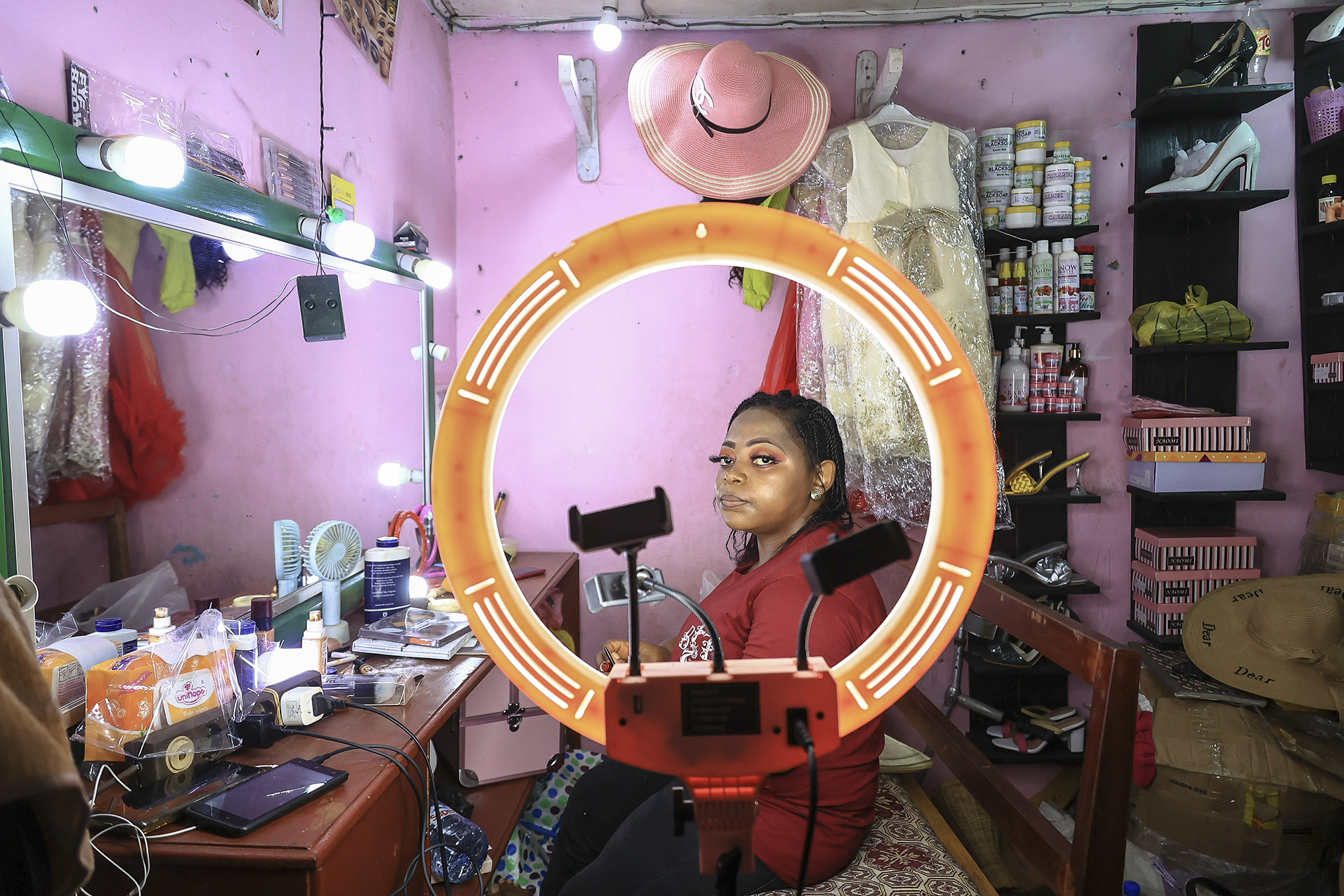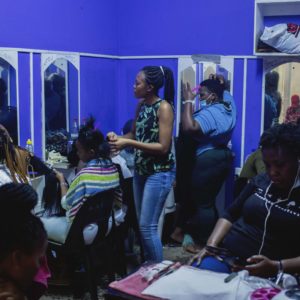Prejudice robs disabled women of work in Cameroon
Laws to protect disabled people are not enforced in the central African nation, leaving many without jobs. But a local organisation is helping equip disabled women for work.
Author:
15 December 2021

Less than 4% of Cameroonians are unemployed, according to the National Institute of Statistics, but this fact does not tell the full story. For the hundreds of thousands of jobless people in the central African nation, which has been under the rule of President Paul Biya for close to 40 years, trying to find work is often discouraging, even if you are a graduate. For disabled women and girls who face discrimination, getting a job is especially difficult.
Brendaline Ngebi Azeh, 33, is a disabled woman who has faced prejudice in her job search. After Azeh graduated with a diploma in accounting from the National Polytechnic University Institute Bamenda in 2014, she was sure she would find a job. Instead, she was turned away.
“During my job hunt, when I drop my application, they will assure me they are going to call but that never happens,” Azeh says. At one point, she applied for a job at a microfinance firm in the city of Bamenda. “After the written phase of the recruitment exercise, someone informed me I had passed and had to go for an interview. But immediately [as] I approached the gate, the manager held the list tight to him and told me my name wasn’t on it. I was taken aback. I asked to see the list but he vehemently refused. I left in disappointment.”
Related article:
Susan F, who did not want to give her full name, has had similar experiences. The 32-year-old who lives on the outskirts of Kumba has tried to get several jobs in retail and fashion design. When she finally found a tailoring job, the crisis in the English-speaking regions of Cameroon broke out and she lost it. She now lives on family support.
Disabled women and girls in the English-speaking regions of Cameroon have been the hardest hit, especially in the past five years. Instability in the restive region has aggravated existing vulnerabilities and some disabled women have had to leave everything behind as they flee the hostilities, according to Nkengafack Eucharia of Reach Out Cameroon, a women-centred non-governmental organisation.
“They also go through particular difficulties, due to their low social status and perceived inability, in getting necessary assistance and work,” Eucharia says.
Toothless laws
Statistics on disabled people in Cameroon are not available, but the Club for Young Rehabilitated Blind People estimates that there are three million disabled people in the country, which has a population of 26.5 million. In a bid to safeguard their rights, the government adopted a law on the protection and promotion of disabled people in 2018. But the provisions of the law apply only to people who hold a national disability card and can prove a “permanent potential incapacity rate” of at least 50%. Many find it difficult to get this card.
“Since most parents of children with disabilities are poor and are not sensitised on the importance of the card, they don’t go for it. This obviously excludes them from benefitting from the law,” says Acha Rita from SisterSpeak237, an organisation that amplifies the voices of women and minority groups in Cameroon.
“Enacting the law was a very good step and having a text of application of the law was even better and shows the political will of the government. However, when it comes to equal opportunities in employment, there are no penal dispositions which compel employers to prioritise more competent PWDs [people with disabilities] over other applicants. Any law with no penal dispositions is as good as not having a law.”
Though the government claims it wants to protect disabled people, Awa Rumarick Mokom, a human rights advocate and paralegal at the Centre for Human Rights and Democracy in Africa, says otherwise. “Government is yet to implement the law in earnest. Different national laws and international legal instruments ratified by Cameroon relating to the protection and promotion of PWDs are lofty. But there should be real implementation of these laws and massive sensitisation,” he says.

Douglas A. Achingale, deputy general manager of the Cardinal Paul Emile Leger National Centre for the Rehabilitation of Persons with Disabilities, says access to buildings is also still a problem. “This is so despite the existence of legal texts which call for such buildings to be constructed in such a way that they are accessible to PWDs, or be renovated to be such … How does someone on crutches, for instance, access such a building hosting an office?” Achingale asks.
Achingale, who uses crutches, says Cameroonians discriminate against disabled people. “They are generally considered inferior by their so-called able-bodied counterparts … You can’t employ a person you stigmatise,” he says. He also blames parents who think their disabled children are worthless and do not deserve an education. “Without a good education, being profitably employed is not very [easy].”
Achingale organises regular wheelchair basketball tournaments to encourage social integration. Through the sport, he aims to reduce isolation, help disabled people accept each other and eliminate prejudice as well as build self-confidence, optimism and courage.
Empowering women workers
SisterSpeak237 supports disabled women through its Access to Work programme. According to Comfort Mussa, the organisation’s executive director, women with disabilities are more likely to be impoverished and excluded.
“We had our evaluation and we realised the challenges most of these women had are attached to poverty, lack of skills and education because when you cannot walk, you are bound to be poor and due to that you cannot buy accessibility devices. We have women who are crawling because they cannot afford wheelchairs. Sometimes they cannot go to school,” Mussa says.
Mussa and a team of volunteers have made significant strides to reverse these injustices by training and equipping disabled women with skills that make them employable in jobs that require less mobility.

“We also coach them to have a clear vision of where they are and where they have to go. After this coaching, we pair them with mentors. Each of the participants has something tangible that they are doing or will be doing after the training,” Mussa says. They then help with job placement.
Azeh says the Access to Work programme found her when she was at her lowest. “But when I listened to some of the motivational speakers, it gave me courage, and my spirit was revived. After the training, I became active and could multitask. I learned different skills, from catering [and] fashion to graphic design … And I have … jobs thanks to this,” she says.
After Azeh learned graphic design, an employer gave her more hands-on design training. But without a laptop, she could not continue. Now, she is a nail technician and does make-up. She plans to raise money to boost her business so she can employ others.

